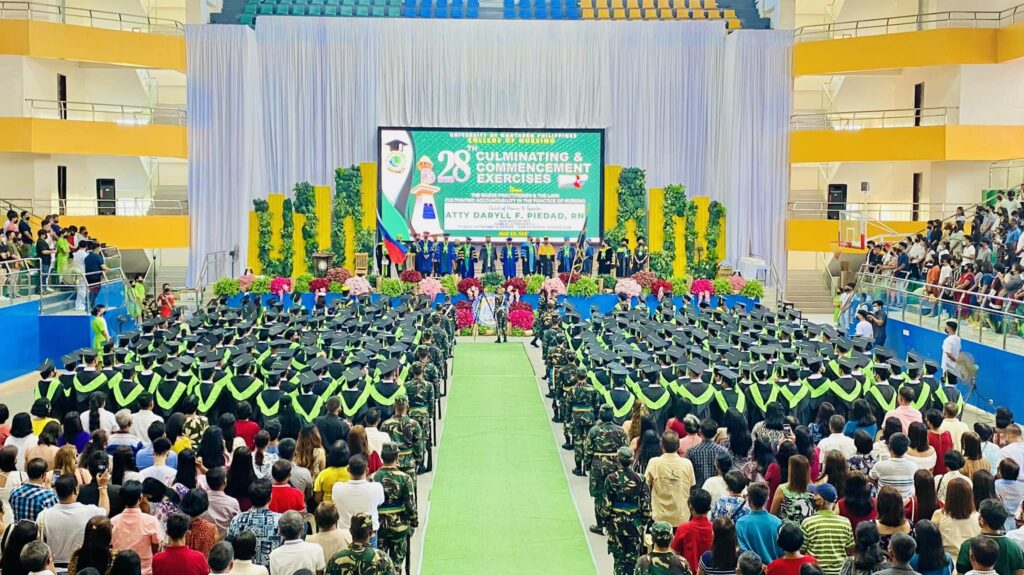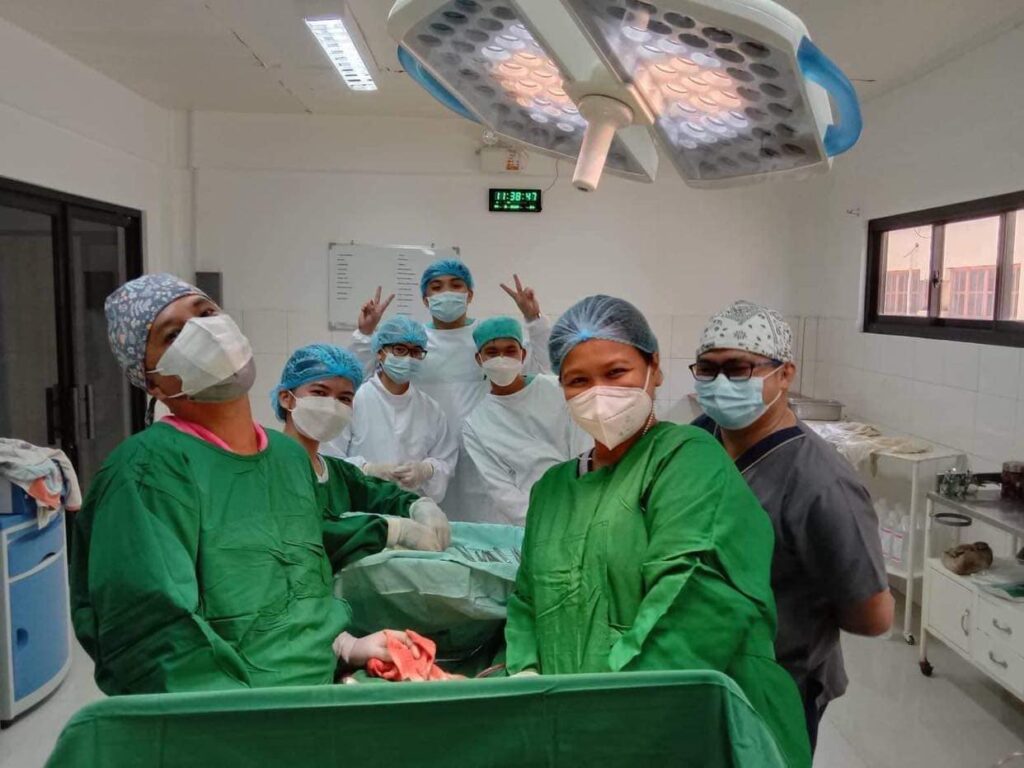About Us
By 1973, there were no BSN graduates because the students joined the demonstration for a change in the CN administration and policies. During this time, Ms. Cecilia Biteng Bayeng relieved Dean Pagador. The supposed to be graduates of Batch 1973 joined the graduates of Batch 1974 with a total of 17 graduates. All passed the Nurses Board Examination (NBE). In 1975 and 1976, the CN again gained 100% passing rate in the NBE with Ms. Lilia A. Salvador landing on Top 4.
In 1977, the BSN program was later shortened to four years pursuant to the directive of the Ministry of Education, Culture and Sports. This move, however, required the integration of some nursing subjects and the offering of courses during summer classes to complete the prescribed content. In 1978, there were a total of 40 graduates but only 39 took the Board Exam. Again, the CN gained 100% passing rate in the NBE.
In 1981, Dean Bayeng retired from the service and Ms. Lilia Salvador was designated the third Dean. After 18 years of operation, the College of Nursing became the Institute of Nursing in 1983 by virtue of Board Resolution No. 25 S. 1982. In 1995, Prof. Brigida Mercedes F. de Leon was designated as fourth Dean after the retirement of Ms. Lilia A. Salvador. In the same year, the Institute of Nursing was awarded Level I Candidate Status by the Accrediting Agency of Chartered Colleges of the Philippines (AACCUP), Inc.
Cognizant to the need for more relevant curriculum that is responsive to the problems and needs of the country, the Institute of Nursing started to implement the Associate in Health Science Education (AHSE) BSN Curriculum in June 1998, per CHED Memorandum Order (CMO) No. 27 S. 1998. This curriculum focused on the enrichment of contents and a change in approach requiring the integration and proper sequencing of concepts for more meaningful learning experiences that could enhance the competencies of the nurse and to function effectively in a changing society.
In 1999, Dr. Marciana P. De Vera was designated as Dean of the College of Nursing. In 2002, the Institute was awarded Level II Re-Accredited status by the AACCUP, Inc. Four years after, the Institute of Nursing was converted to College of Nursing per Memo Circular No. 01, S. 2006. This move was in keeping with the status of the institution as a University under the administration of Dr. Lauro B. Tacbas. In 2007, Prof. Brigida F. de Leon was re-appointed as the Dean of the College. Two years later, the College implemented the CMO No. 14, S. 2009 entitled Policies and Standards for Bachelor of Science in Nursing (BSN) Program as a result of the recommendation of the CHED Technical Panel for Nursing Program.
In 2013, with the impetus of maintaining good academic standards as stipulated in the Ten-Point Agenda of President Gilbert Arce, the College underwent program accreditation and was awarded Level III Re-accredited status by the AACCUP. It was also in the same year that the College obtained a 100% percent passing rate in the Nurse Licensure Examination (NLE).
After the retirement of Dean Brigida Mercedes F. de Leon in 2013, Dr. Julieta T. Gunid assumed the post as Dean of the College. In 2016, aiming to involve all stakeholders in the activities of the college, the CN Parents, Teachers and Cooperating Agencies Association (CN-PTCAA) was organized. The organization envisions to cater to the needs and concerns of its stakeholders. Through the concerted efforts of the faculty, students and other stakeholders and with the support of the UNP administration, the College passed the Level 1V first survey visit by the AACCUP in 2018.
Through the years, the College maintained its mandate to produce quality professionals as evidenced by the “very satisfactory” passing percentage in the Board Examination given each year. It has forged linkages with government and non-government organizations with the intention to improve instruction. Numerous extension programs and activities were conducted to help improve its services to the different communities. It also continues to maintain its partnership with its alumni.
To date, the College has been a great contributor of competent professionals who have joined the workforce in nursing education, nursing service, nursing legislation, nursing entrepreneurs, and law enforcement services. The faculty humbly remain conscious and dedicated to their roles to achieving the mission and goals of the University.





Goal
Objective
History
In 1967, the College of Nursing (C.N.) was created following the UNP Board Resolution No. 109, s. 1967 in collaboration with Gabriela Silang General Hospital. It initially conceptualized a four-year Bachelor of Science in Nursing (BSN) program. However, the following year, it started to offer a five-year degree program leading to the Bachelor of Science in Nursing (BSN) with Liberal Arts as its pre-nursing course. Ten pioneer students were under the administration of the first Dean, Ms. Florencia Pagador. Five years after, they graduated with a 100% passing mark in the 1972 Nurses’ Board Examination (NBE).
By 1973, there were no BSN graduates because the students joined the demonstration for a change in the C.N. administration and policies. During this time, Ms. Cecilia Biteng Bayeng relieved Dean Pagador as the Dean of the college. The supposed-to-be graduates of Batch 1973 joined the graduates of Batch 1974 with a total of 17 graduates. All passed the NBE. In 1975 and 1976, the C.N. gained a 100% passing rate in the NBE, with Ms. Lilia A. Salvador landing in the Top 4.
According to the Ministry of Education, Culture, and Sports directive, the BSN program was shortened to four years in 1977. However, this move required integrating some nursing subjects and offering courses during summer classes to complete the prescribed content. In 1978, there were 40 graduates, but only 39 took the Board Exam. Again, the C.N. gained a 100% passing rate in the NBE.
In 1981, Dean Bayeng retired from the service, and Ms. Lilia Salvador was designated the third Dean. After 18 years of operation, the College of Nursing became the Institute of Nursing in 1983 by virtue of Board Resolution No. 25, s. 1982.
In 1995, Prof. Brigida Mercedes F. de Leon was appointed as the fourth Dean after the retirement of Ms. Lilia A. Salvador. In the same year, the Institute of Nursing was awarded Level I Candidate Status by the Accrediting Agency of Chartered Colleges of the Philippines (AACCUP), Inc.
Cognizant of the need for a more relevant curriculum responsive to the country’s problems and conditions, the Institute of Nursing implemented the Associate in Health Science Education (AHSE) BSN Curriculum in June 1998, per CHED Memorandum Order (CMO) No. 27, s. 1998. This curriculum focused on the enrichment of contents and a change in approach. It requires the integration and proper sequencing of concepts for more meaningful learning experiences that could enhance the competencies of the nurse to function effectively in changing society. The year after, Dr. Marciana P. De Vera was selected as Dean of the College of Nursing. In 2002, the Institute was awarded
Level II Re-Accredited status by the AACCUP, Inc. Four years after, the Institute of Nursing was converted to the College of Nursing per Memo Circular No. 1, s. 2006. This move is in keeping with the institution’s status as a University under the administration of Dr. Lauro B. Tacbas.
The following year, Prof. Brigida F. de Leon was re-appointed as the Dean of the College. In 2009, the College implemented the CMO No. 14, s. 2009, entitled “Policies and Standards for Bachelor of Science in Nursing (BSN) Program,” as a result of the recommendation of the CHED Technical Panel for Nursing Program.
In 2012, with the impetus of maintaining good academic standards in the Ten-Point Agenda of President Gilbert Arce, the College underwent accreditation. The AACCUP awarded it Level III Status. The following year, the College was awarded Level III Re-accredited status by the AACCUP and obtained a 100% passing rate in the Nurse Licensure Examination (NLE). After the retirement of Dean Brigida Mercedes F. de Leon in 2013, Dr. Julieta T. Guinid assumed the post of the Dean of the College. In the same year, the college was certified by the AACCUP with Level III Re-accredited status for its BSN program.
In 2014, the College of Nursing held into its arms the Master of Arts in Nursing program when the university Graduate School, as a separate unit, was abolished. The dissolution of the Graduate School was in line with the vertical articulation of degree programs as envisioned by Dr. Arce.
In 2016, the C.N. Parents, Teachers, and Cooperating Agencies Association (CN-PTCAA) was organized to involve all stakeholders in the College’s activities. The organization envisions catering to the needs and concerns of the faculty and staff of the College, students and their parents, and other cooperating agencies.
Recognizing the need to shift from competency-based standards to outcomes-based education, C.N. implemented the CMO No. 15 s. 2017. This memorandum specified the BSN program’s policies, standards, and guidelines (PSG). This PSG provides ample space for HEIs offering a BSN program to innovate in the curriculum in line with the assessment of how to best achieve the learning outcomes in their particular contexts and their respective missions.
In 2018, the College submitted the BSN program for accreditation by the Accrediting AACCUP. After days of rigorous scrutiny of documents and physical observation of the activities of the College, Level IV Phase I certification was issued. In 2021, a Preliminary Survey Visit of the MAN program was conducted by the AACCUP, and the same agency awarded the program as a candidate for Level I accreditation.
The year 2019 marked a new leadership in the university. Dr. Erwin F. Cadorna held the helm of the University Presidency. Stemming from the Developmental Goals of the President, the University endeavored to be International Organization for Standardization (ISO) certified. Through the collaborative efforts of the UNP Community and true to the university’s mantra “Together, we soar higher. Together, we build character. Together, we create a future,” the University of Northern Philippines was certified to be ISO 9001:2015 compliant by the SOCOTEC. The said certification manifests that the management system, processes, services, and procedures of the entire university are at par with international standards. The College of Nursing was included in the said certification.
Retiring from government service in 2022, Dr. Guinid passed the College leadership to Dr. Francis Don Nero. Under the helm of Dr. Nero, the BSN program of the College was awarded Level IV Re-accredited Status by the AACCUP in 2022. In the same year, the graduates of the BSN program aced the May 2022 NLE with a 100% passing percentage. Continuing its successful milestones for the same year, the MAN program is awarded Level I Accredited Status by the AACCUP in November. The College ended the year on a high note when it scored a 98.76% passing rate and produced two topnotchers during the November 2022 Philippine Nursing Licensure Examination.
The College started the year 2023 with the conduct of the 2023 Nursing Education Conference, an international seminar it co-sponsored with the Philippine Nurses Association of America Foundation and Philippine Nurses Association–Ilocos Sur Chapter. It was also this year that a student of the College was hailed as 1st runner-up during the National Round of the 1st Anastacia Giron-Tupas Nursing Quiz Bee.
The College of Nursing continues to move forward and innovate to be responsive to the needs of the times. Capitalizing on its strong faculty workforce and sustained dynamism, the College constantly explores possibilities and opportunities for growth to maintain the culture of excellence that the college has known for. Since day one of its existence, the College of Nursing has always lived by its mantra, “Excellent nursing education is our lasting legacy, and the competent nurses we produce are our forever gift to humanity.”
Our Extension Services
The College of Nursing, which houses the caring profession whose original main goal is the care of the healthy and sick across the lifespan and in a variety of settings, comes naturally to Extension and Community Development. The fundamentals of nursing, which comprise the crucial aspects of the nursing process, are basic components used in the community’s comprehensive care. The Nursing Program is a potent tool that produces natural leaders in community care because it is based on the fundamental principles of the curriculum and strengthened by dynamic information from research.
The CARE Project
The Community Assistance, Rehabilitation and Empowerment (CARE) Project is an initiative of the College of Nursing that aims to assist, rehabilitate and empower specific community towards its optimal level of functioning. It is designed to bring together various organizations to create a network and work together to help the community meet their needs and capacitate its member with relevant skill for a proactive and sustainable development.
OFFICE OF THE PRESIDENT
-
University of Northern Philippines
3rd Floor- Admin Building, Tamag, Vigan, Ilocos Sur - (077) 644-2261
- op@unp.edu.ph
Registrar's Office
- registrar@unp.edu.ph
- UNP Registrar's Office
Admission Services
- admissionservices@unp.edu.ph
- UNP Admission Services
Public Information Office
- pioffice@unp.edu.ph
- University of Northern Philippines
Guidance and Counseling Services
- guidance@unp.edu.ph
- University of Northern Philippines
